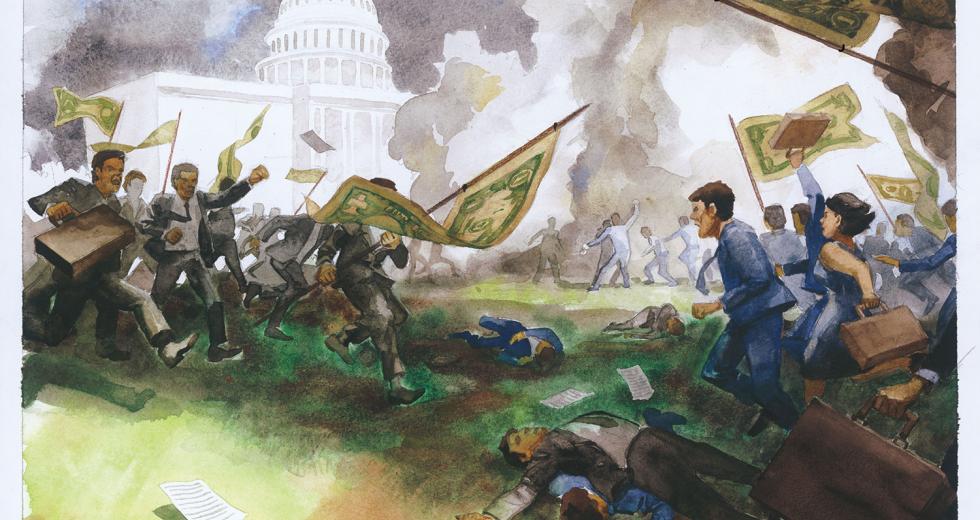On a morning in April, eight representatives of local banks and credit unions walked into the Sacramento Metro Chamber headquarters to discuss the region’s lousy credit situation.
For the past few years, businesses have accused lenders of being too tight-fisted with commercial loans. In response, the chamber assembled some prominent names from the local financial services industry and sat them down for answers.
“The opinion around the table was that there was a misunderstanding of what the real problem was,” says Jerry Kinlock, CEO of Sacramento Credit Union. “People think they can go in with a business model and say…‘I got this idea. You lend me $20,000 or $100,000, and I can open up a car wash and start making money.’ A weak business plan with a good idea — who is going to lend on that?”
Meanwhile in Washington, D.C., a special-interest war rages over legislation that supporters say would open nearly $200 million in new business credit to the Capital Region and create more than 2,000 jobs.
Specifically, the bill would allow about 1,850 credit unions nationwide to increase their member-business lending portfolio up to 27.5 percent of total assets from the current 12.25 percent limit. About 400 credit unions already have strong commercial portfolios and might dramatically expand their business lending if the cap were lifted. The average credit union business loan is approximately $220,000.
Credit unions boast that they can sometimes offer better loan products than banks. Bankers don’t disagree, but cry foul because credit unions undercut the competition through a nonprofit status that shields them from state and federal taxes. Furthermore, critics accuse the cooperatives of being unfit loan underwriters and argue that increased business lending could spur more taxpayer bailouts.
The credit unions and their federal regulators dispute those charges and have rallied support around the pending legislation by promising to deliver every lawmaker’s favorite four-letter word.
“This will create lots of jobs,” says Bob Arnould, legislative representative for the California and Nevada Credit Union Leagues. As for the local impact, Arnould says the heavy government worker population here has created a robust credit union presence, so “the Sacramento region would be one of the biggest beneficiaries in California (following) passage of this piece of legislation.”
Credit unions emerged in 19th century Europe as a way for workers to fend off loan sharks by pooling together their savings to lend to colleagues and neighbors. The idea crossed the Atlantic in the early 20th century, and in 1934, President Roosevelt signed the Federal Credit Union Act, establishing a national chartered system.
Tensions between banks and credit unions existed for decades as the nonprofit lenders lobbied Congress to reduce rules that restricted their memberships. The conflict boiled in 1998 with passage of a federal law that expanded member eligibility criteria beyond a “common bond” of occupation. As a result, to join a credit union today, most applicants now only need a heart rate somewhere in the double or triple digits.
But that 1998 law also included a concession to the banking industry: Credit unions could only lend 12.25 percent of their assets to businesses. Since then, credit union lobbyists have fought to raise the so-called member-business lending (MBL) cap. Now, with legislation pending before Congress that would raise the MBL cap to 27.5 percent, advocates say they are on the verge of a win.
“Congress is becoming more exasperated with the banks,” says Arnould. “And they are looking over and seeing credit unions with capital on hand, expertise on hand to make loans. Small businesses are needing money, and increasingly, I think members of Congress are thinking that it’s silly to let an association fight get in the way of putting people back to work.”
But passage of the bill, S. 2231, remains uncertain. In March, author Sen. Mark Udall (D-Colorado), tried to attach his legislation to the Jumpstart Our Business Startups Act. But not wanting to jeopardize the bipartisan JOBS bill, Senate Majority Leader Harry Reid nixed the measure and promised Udall a separate vote.
Federal legislators also have conceded, however, that S. 2231 makes them uncomfortable. Choosing sides between the well-heeled bank and credit union lobbies is a decision lawmakers would rather not make, especially during an election year.
“This is a very controversial matter,” admitted Sen. Tim Johnson
(D-South Dakota), chair of the Senate Committee on Banking, on
the Senate floor in March. “I urge the Senate to move forward
carefully.”
“People think they can go in with a business model and say … ‘I got this idea. You lend me $20,000 or $100,000, and I can open up a car wash and start making money.’ A weak business plan with a good idea — who is going to lend on that?”
Jerry Kinlock, CEO, Sacramento Credit Union.
About a month later, Sen. Charles Schumer (D-New York), a member of the Senate Democratic leadership and co-sponsor of the bill, disclosed that the legislation had been indefinitely postponed. As pundits have noted in American Banker, a financial industry daily newspaper, predicting where the bill goes from here is tricky.
Observers believe the bill would likely be delayed until after the election and thrust in the lame-duck session between Nov. 6 and Dec. 31. During that time, Congress is also expected to take up matters such as raising the debt ceiling and extending the Bush tax cuts — actions that could postpone the bill until the next session. Whatever happens, raising the MBL cap is a top legislative priority for credit unions, and their influence will not cave under a new Congress or president.
If the legislation does become law, the Credit Union National Association projects credit unions nationwide would increase member-business lending by 40 percent, an estimate the trade group calls conservative. As it stands, out of nearly 2,000 credit unions nationwide that are subject to the MBL cap, only about 150 are significantly close to it. Three regional credit unions interviewed for this article are not close to the cap, but they still advocate for the bill.
Credit union presidents also say they are not interested in making deals that banks consider too risky. That begs a question as to whether the new law would increase the total available credit in the Capital Region or simply take business away from banks, as the bankers suggest it would. Nevertheless, it is important to note that credit unions generally loan to smaller businesses and have carved out distinct niches.
For example, Sacramento Credit Union considers itself a “boutique shop” that specializes in products like business-vehicle financing and commercial real estate loans. Vacaville-based Travis Credit Union lends to service-oriented startups like small landscaping firms. North Highlands-based SAFE Credit Union has traditionally focused on sole-proprietorships but now delivers business loans up to $5 million. All three of these credit unions provide government-backed Small Business Administration loans.
“The people we do business with appreciate the fact that we’ve been here, we’ll continue to be here and we’ll do whatever it is that they need to have done. It’s one more choice that they have,” says Henry Wirz, CEO of SAFE Credit Union.
Another serious concern voiced by bankers and other observers is that credit unions are largely unqualified to underwrite business loans. The global credit rating agency Fitch Ratings delivered this opinion in April, stating the practice was too risky since credit unions have “limited experience” in member-business lending and haven’t built up the appropriate infrastructure.
Giving further ammo to the legislation’s opponents, Chatsworth-based Telesis Community Credit Union fell into federal conservatorship in March after regulators exempted the lender from the MBL cap (exemptions from the cap are available in certain circumstances and have been awarded to about 1,200 credit unions). Bankers argue that these kinds of failures lead to higher premiums for all credit unions. If the MBL cap is increased, they claim, credit unions could fail in massive numbers and require a federal bailout.
“This country doesn’t need any more businesses that are not properly supervised and regulated to have the taxpayer bail them out,” says Rodney Brown, president of the California Bankers Association.
The pending legislation contains safeguards meant to keep inexperienced credit unions from handing money to anyone who dreams of starting a car wash. To exceed the 12.25-percent cap, credit unions would need to be well-capitalized and demonstrate five years of sound underwriting and servicing business loans. The MBL portfolio could only expand incrementally under constant monitoring by the National Credit Union Administration, a federal regulator that operates an insurance program for credit union accounts up to $250,000. The administration supports S. 2231, arguing that recent credit union failures have not increased premiums and that the “vast majority” of the 2,197 federally insured credit unions performing member-business lending are competent.
“Our core interest is in safety and soundness. We have determined that (member-business lending) is a healthy part of the credit union system,” says John Zimmerman, an administration spokesman. “There has never even been a suggestion of a taxpayer bailout. That’s kind of an abstraction that you can’t really quantify.”
Douglas Kraft, a Citrus Heights-based commercial lending attorney, says credit unions are at risk when they shop underwriting out to a third party. Some third-party underwriters are inexperienced, he says, while others are paid based on the number of loans they approve, creating an incentive to give undeserving borrowers the green light.
“You need to have the right people in commercial lending, and the successful people tend to stay with banks,” he says. “(Credit unions) need good, solid people who know commercial lending, and a third party is fine, but they have to know what they are doing.”
The passage of S. 2231 might benefit local businesses through increased lending competition and a widening of available credit, but it will not improve a borrower’s credit score or help him or her design a credit-worthy business plan. To fill that gap, the Sacramento Metro Chamber plans to host morning workshops on July 19 and July 24 in which a panel of bankers, credit union representatives and venture capitalists would explain the current lending situation and how to access credit.
“We’re going to do what we can to help these (potential borrowers) more professionally approach these lenders so they will be better-looking candidates for financing,” says John Frisch, chair of the Metro Chamber. “If businesses are able to get loans, they can hopefully have some jobs or at least be more productive and pay more taxes and improve their business and quality of life.”
Recommended For You

Merge or Purge
Community banks contemplate consolidation as regulatory costs grow
Banks throughout the country are putting new practices in place to comply with an onset of new federal regulations prompted by the 2010 Dodd-Frank Wall Street Reform and Consumer Protection Act and other post-meltdown rule changes. Those expensive efforts are sparking major changes and concerns for some of the Capital Region’s smaller lenders.

Lending Competition
Weighing the pros and cons of bank size
In the Capital Region and beyond, some customers are switching from large financial institutions to smaller community banks, partially in response to columnist Arianna Huffington’s December 2009 “Move your Money” campaign, which encouraged consumers to do just that.



